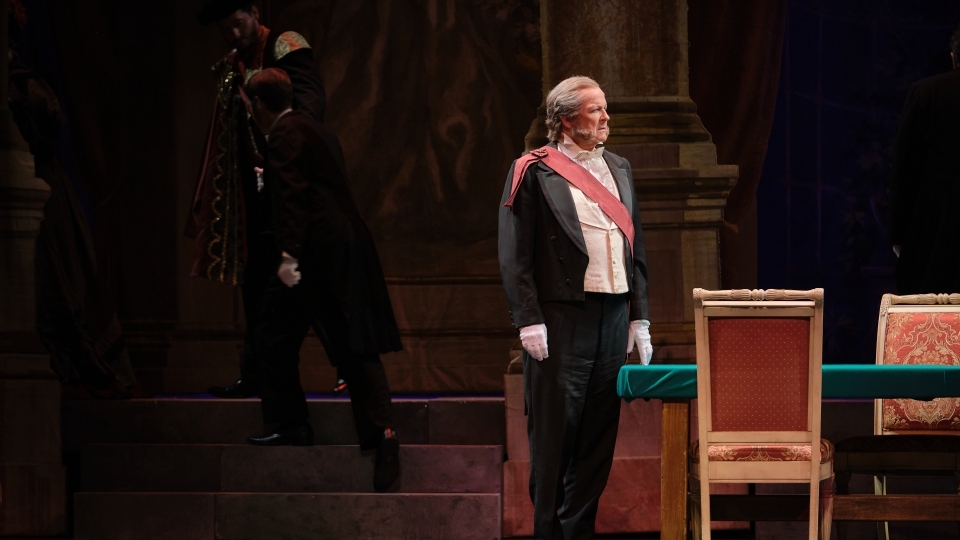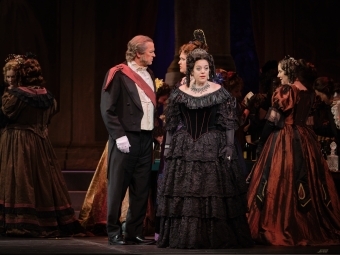Aria of Expertise: Students Steeped in the Science of Sound
June 5, 2023
- Author
- Jay Pfeifer

Physics Prof. Dan Boye in an OperaCarolina performance of La Traviata.
In late April, a handful of physics students traveled to downtown Charlotte with an unusual assignment: They were there to take in one of three OperaCarolina performances of La Traviata, the 19th-century opera classic that inspired movies like Pretty Woman and Moulin Rouge.
As they watched the timeless romance play out, however, many found their eyes turning away from the stage to the domed roof of the Belk Theater, studded with LED lights.
“I didn’t know what to expect,” wrote Vanessa Anguiano ’26. “I especially enjoyed looking up at the domed architecture, both inside the auditorium and outside in the lobby. The power of the actor’s voices were impressive, booming into the audience without a single microphone in sight.”
The theater is large enough to seat over 2,000 people but it channels sound so efficiently that amplification is unnecessary.
“I was really interested in the way that sound carried so well, and it was cool knowing the scientific reasoning behind this,” McLean Hamer ’25 wrote after the performance. “At first, I thought the singers had mics! Because of what we have learned in class, I found myself looking more carefully at my surroundings to see the materials used in the theater and the ways that the performers worked to make everything run smoothly.”
This is exactly what Physics Professor Dan Boye wanted. His class, “Music: Sound With Impact,” is listed in both physics and music but it is not a typical “music appreciation” class.
“This class is designed to cultivate a scientific appreciation of music,” Boye said. “Not historic or thematic. I want them to appreciate the science and artistry of sound.”

Students traveled to Charlotte for an OperaCarolina performance featuring their professor, Dan Boye. Boye, a physics professor, joined other Davidson College profs from the music department in this year’s production.
Boye is unusually qualified to lead this class. His bass/baritone voice has been a part of OperaCarolina for over 30 years. During this performance, he was on stage, playing Baron Duphol. (Music department faculty members Amanda Sesler Davis, Harrison Bumgardner, and Melinda Whittington Bugaiski also performed in this production with Whittington portraying the title figure, Violetta.)
“Music: Sound With Impact” is targeted toward students who are not science majors, and their engagement with music varies widely.
“For some students, the only thing they have played before is the ‘play’ button,” Boye said. “Others are in the orchestra.”
Despite the variation, Boye said no one has an advantage in his class. “You level the playing field with rudimentary instruments and instruments that no one has played,” he said.
Boye’s students build their own instruments, ranging from crude whistles fashioned from PVC pipes to wood and cardboard dulcimers that students learn to play (and personalize with custom paint jobs).
For their final project, students put together a 10-minute presentation that analyzes the unique power and design of a song that has had a strong impact on their lives.
“The projects include analysis of the musical, scientific and social impacts of the chosen songs,” he said. “Students need to address why they chose the song they did and must demonstrate an understanding and appreciation of the music.”
Boye gives students free rein to choose any song.
“One student chose the World Cup theme song ‘Gloryland,’” he said. “That’s a perfect example of a piece of music that has a truly global audience and impact. The student looked at the frequency spectra and tone envelopes for the instruments chosen to record the melody in GarageBand.”



